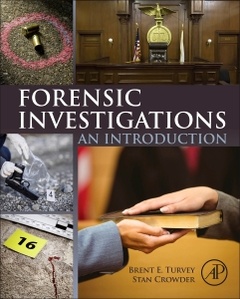Description
Forensic Investigations
An Introduction
Authors: Turvey Brent E., Crowder Stan
Language: English
Subject for Forensic Investigations:
Keywords
Academia; Admissibility; Adversarial system; Autopsy; Availability heuristic; Bias; Capital murder; Cause of death; Coercive interrogation; Confession; Control question test (CQT)Directed lie; Coroner; Corpus delicti; Corrections; Corroboration; Courts and the judiciary; Crime reconstruction; Crime scene analysis; Crime scene investigation; Crime scene processing; Crime scene; Criminal justice system; Critical thinking; CSI effect; Data integrity; Deification; Disposal site; Documentation; Due process; Duty of care; Ethical dilemma; Ethics; Evidence; False allegations; False confession; False negative; False positive; Falsification; FBI effect; Field test; Forensic interview; Forensic investigation; Forensic investigator; Forensic neutrality; Forensic nursing; Forensic pathology; Forensic science; Forensic scientist/forensic examiner; Forensic services; Forensic victimology; Forensic; Guilty knowledge test (GKT)Inconclusive polygraph test; Intermediate crime scene; Investigation; Investigator; Istanbul protocols; Justice; Latent evidence; Law enforcement; Legal justice; Lifestyle exposure; Logical fallacy; Macroscopic evidence; Manner of death; Medical doctor; Medical examiner; Medical opinion; Medical or patient history; Medicolegal death investigator; Medicolegal; Metacognition (a.k.a; self-monitoring)Science; Microscopic evidence; Mitigation; Morality; Polygraph; Primary crime scene; Probation; Professional ethics; Rape; Scientific fact; Secondary crime scene; Semen; Sentencing; Sexual assault; Situational or incident exposure; The scientific method; Torture in Mexico; Torture; Victim exposure; Victim risk; Vilification
414 p. · 19x23.3 cm · Hardback
Description
/li>Contents
/li>Biography
/li>Comment
/li>
The terms forensic investigator and forensic investigation are part of our cultural identity. They can be found in the news, on television, and in film. They are invoked, generally, to imply that highly trained personnel will be collecting some form of physical evidence with eventual scientific results that cannot be questioned or bargained with. In other words, they are invoked to imply the reliability, certainty, and authority of a scientific inquiry.
Using cases from the authors? extensive files, Forensic Investigations: An Introduction provides an overview of major subjects related to forensic inquiry and evidence examination. It will prepare Criminal Justice and Criminology students in forensic programs for more specialized courses and provide a valuable resource to newly employed forensic practitioners. Written by practicing and testifying forensic professionals from law enforcement, academia, mental health and the forensic sciences, this work offers a balanced scientific approach, based on the established literature, for broad appeal.
The purpose of this book is to help students and professionals rid themselves of the myths and misconceptions they have accumulated regarding forensic investigators and the subsequent forensic investigations they help to conduct. It will help the reader understand the role of the forensic investigator; the nature and variety of forensic investigations that take place in the justice system; and the mechanisms by which such investigations become worthy as evidence in court. Its goals are no loftier than that. However, they could not be more necessary to our understanding of what justice is, how it is most reliably achieved, and how it can be corrupted by those who are burdened with apathy and alternative motives.
1. Forensic Investigations: A Primer2. Law and Evidence3. Investigative Ethics4. Investigators and the Scientific Method5. Crime Scene Investigation and Analysis6. Crime Scene Processing7. Forensic Victimology8. The Sexual Assault Examination9. Medicolegal Death Investigation: Protocols and Practice10. Forensic Interviews11. The Polygraph: Uses and Misuses12. Investigating Allegations of Police Torture: Forensic Protocols and Psychological Assessment13. Forensic Investigations for Court: Probation, Sentencing, Mitigation Issues in Capital Cases14. Oklahoma v. Elvis Thacker: Evaluating Victimology, Victim Sexual Assault Evidence, Suspect Torture by Law Enforcement, and the Quality of a Forensic Investigation
Brent E. Turvey spent his first years in college on a pre-med track only to change his course of study once his true interests took hold. He received a Bachelor of Science degree from Portland State University in Psychology, with an emphasis on Forensic Psychology, and an additional Bachelor of Science degree in History. He went on to receive his Masters of Science in Forensic Science after studying at the University of New Haven, in West Haven, Connecticut.
Since graduating in 1996, Brent has consulted with many agencies, attorneys, and police departments in the United States, Australia, China, Canada, Barbados and Korea on a range of rapes, homicides, and serial/ multiple rape/ death cases, as a forensic scientist and criminal profiler. He has also been court qualified as an expert in the areas of criminal profiling, forensic science, victimology, and crime reconstruction. In August of 2002, he was invited by the Chinese People's Police Security University (CPPSU) in Beijing to lecture before groups of detectives at the Beijing, Wuhan, Hanzou, and Shanghai police bureaus. In 2005, he was invited back to China again, to lecture at the CPPSU, and to the police in Beijing and Xian - after the translation of the 2nd edition of his text into Chinese for the University. In 2007, he was invited to lecture at the 1st Behavioral Sciences Conference at the Home Team (Police) Academy in Singapore, where he also provided training to their Behavioral Science Unit. In 2012 Brent completed his PhD in Criminology from Bond University in Gold Coast, Australia.
He is the author of Criminal Profiling: An Introduction to Behavioral Evidence Analysis, 1st, 2nd, 3rd and 4th Editions (1999, 2002, 2008, 2011); co- author of the Rape Investigation Handbook, 1st and 2nd Editions (2004, 2011), Crime Reconstruction 1st and 2nd Editions (2006, 2011), Forensic Victimology (2008) and Forensic Fraud (2013) - all with Elsevier Science. He is currently a full partner, Forensic Scie
- A primary text for instructors teaching forensic courses related to criminal and forensic investigation
- Written by forensic professionals, currently in practice and testifying in court
- Offers applied protocols for a broad range of forensic investigations
- Augments theoretical constructs with recent, and relevant case studies and forensic reports
- Based on the most recent scientific research, practice, and protocols related to forensic inquiry




